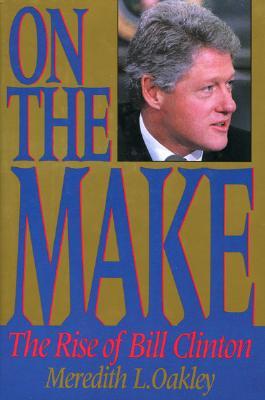Never did I appreciate so much the genius of the Founding Fathers as after finishing this remarkable biography of President Clinton. The authors of the Constitution created a government which makes it impossible for the United States to be transformed into a continental Dogpatch some millions of square miles in extent, which is precisely what this country would be if President Clinton could run it as he did his Arkansas fiefdom—that small, dirt-poor Southern state—as governor for six terms.
Ms. Oakley, who as a Little Rock political journalist saw and talked with Clinton almost daily from 1979 on, has provided us with facts, figures, and inside stories about Clinton in Arkansas which add up to the single question: how did this super-conman become President of the United States? Had her book been published before the 1992 Democratic National Convention, it is doubtful that Clinton could have been nominated, let alone elected. Readers of Ms. Oakley’s documented stories of Clinton’s violations of law and decency while governor of Arkansas will also ask:
1) How did the national media, electronic and print, with the possible exception of the New York Times and the Washington Times , fail to examine Clinton’s scandalous record as governor?
2) How was it that Clinton’s opponents for the nomination—Tsongas, Brown, Kerrey, and others—never made documented, detailed charges regarding Clinton’s outrageous gubernatorial record?
3) How could President Bush and the Republican campaign committees have ignored that same record?
I emphasize the responsibility of the media because it was they, Ms. Oakley says, who presented Clinton as “a fighter, survivor, a crusader . . . [not a] draft-dodger, womanizer, prevaricator and opportunist.” She writes: “The complete portrait of Bill Clinton was never presented to the American public by the reporters who covered him.” Even now the mainstream media, busy investigating Supreme Court Justice Clarence Thomas’s putative penchant for Playboy and denouncing Newt Gingrich as an “authoritarian,” continue to ignore Clinton’s Arkansas past.
That past includes an unsuccessful attempt by Governor Clinton in 1987 to restrict freedom-of-information rights by attempting to seal all tax records maintained by the state. While income tax records had never been made public under Arkansas law, those of other taxes and fees were available to anyone who asked. When the cloture provision of the new tax bill was uncovered by the press, and media delegations protested the provision, Clinton (supposedly a believer in open government) seemed to agree, and said he would see to it that the offending item was removed from the tax bill. “Less than a week after these reassurances,” according to Ms. Oakley, “Clinton’s lobbyists turned out in full force to promote passage of the bill with the cloture provision intact.”
This bill was no ordinary attack on freedom of information, since the cloture clause made it illegal for state tax officials to release any type of tax information to anyone, including members of the legislature. Worse, not only did it make it illegal for anyone, including legislators, to gain access to any type of tax information from state tax officials, but it provided that the mere request for tax information was punishable by a maximum $1000 fine and a year in jail. Failure by a state official to report such requests to the proper authorities was similarly punishable. You will ask why Clinton went to such an extreme to curtail freedom of information. Was there some overriding democratic principle at stake? It appears that Senator Knox Nelson, then the most powerful member of the Arkansas legislature, was causing Clinton’s legislative program a lot of grief. It was Nelson who wanted the tax records suppressed. The reason?
By Arkansas law, oil companies kept three percent of motor tax revenues they collected as compensation for estimated losses due to fuel evaporation. Nelson, owner of an oil company which received thousands of dollars in such “shrinkage” allowances, claimed that if this information were made known, his competitors would be able to determine his profits and he would therefore be at a competitive disadvantage. Whether Clinton believed this nonsense or not, he again promised to resist the attempt to bar public access to information. Another assault on open government was the sealing of the records of the Arkansas Industrial Commission’s expenditures: a closure, Ms. Oakley claims, that was intended to conceal the desire of a Japanese company to open an industrial plant in a predominantly white community.
Having promised his labor allies in the Arkansas AFL-CIO in 1976 that he would support their petition campaign to modify the right-to-work amendment in the state constitution, Governor Clinton later refused to sign that petition. Though the labor barons remained neutral, Clinton received the AFL-CIO’s endorsement in every subsequent general election. As Ms. Oakley notes, “Throughout his career, there has seemed no transgression his public would not forgive, no lie they would not excuse, no broken promise they would not condone.” While black voters supplied the winning edge in Clinton’s gubernatorial races (particularly that of 1982), the black cochairman of an Arkansas Republican County Committee, deploring the fact that Arkansas lacked what he described as a comprehensive civil rights law, identified “the Democratic Party of Arkansas [as] the reason that we don’t.”
Other matters of interest include Governor Clinton’s illegal political and personal expenditures, and the deletion by Webster Hubbell, self-confessed felon and onetime high official in President Clinton’s Justice Department, of “the original conflict-of-interest clause [in the proposed Arkansas state ethics law] so that Hillary would not have to divulge the names and clients she represented before state agencies.” There is, however, one name Ms. Oakley passes over lightly but that I predict will become better known in the months ahead: Dan Lasater. His involvements with the Clintons in the Arkansas years have yet to unfold. And when they do . . .
[On the Make: The Rise of Bill Clinton, by Meredith L. Oakley (Washington, D.C.: Regnery) 592 pp., $24.95]

Leave a Reply